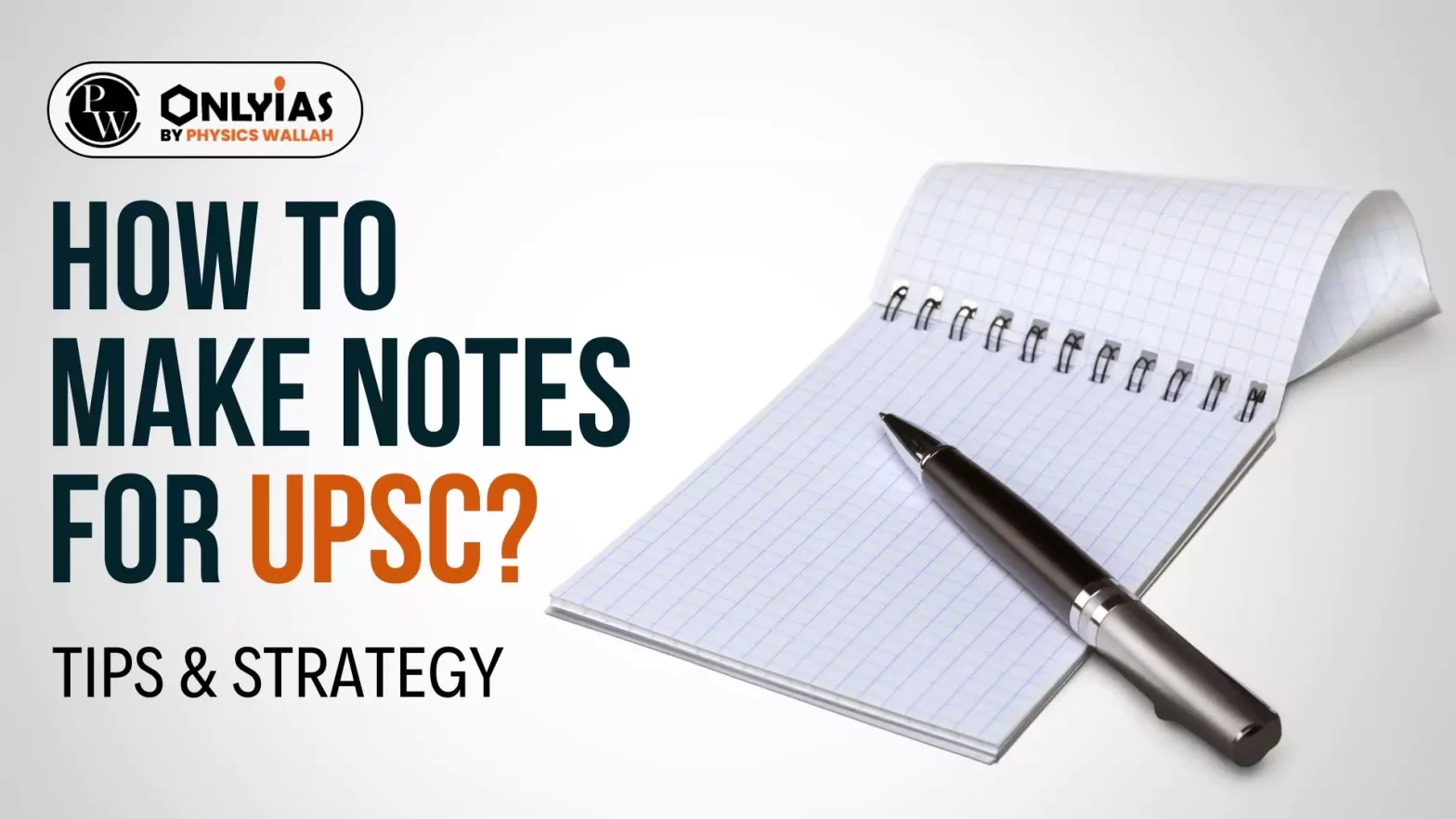Learn how to make effective notes for UPSC preparation, covering prelims and mains, with tips from toppers, utilizing NCERT books and newspapers, and understanding the benefits of note-taking for success in the UPSC exam.

Notes-making for UPSC Exam is one of the most cherished skills of an aspirant. With proper utilisation of that skill, a candidate can convert his/her attempt into a successful one. If you are curious to know more about notes-making for UPSC, you are on the right path, as this article will provide you with all the relevant information to help in your preparation.
Before actually preparing for UPSC, candidates more or less have the same question – How to make notes for UPSC? A beginner may find it rather challenging to understand the minute details that go into UPSC preparation. One such minute detail is making notes for UPSC. It is the most underestimated facet of UPSC preparation, but a critical one when it comes to clearing the exam.
Candidates who have understood the art of making notes will have a great chance of clearing UPSC. This is because notes-making will bring together all the information you have read for the exam. It will help in better revision and recall during the exam.
One of the common traits possessed by toppers is the notes-making skills. While notes-making does not require rocket science, it does require precise strategy and planning. Toppers have always advised aspirants to have their own notes ready for different stages of the examination. These notes prove handy during revision and will also help in recalling during examination.
All previously successful toppers have had their own handwritten notes in one form or other. They have attributed their success to notes-making, and advise others to learn and inculcate the art of notes-making.
In this article, we have compiled various strategies adopted by toppers when it comes to notes-making for UPSC. These strategies will go a long way in helping you clear the UPSC exam.
UPSC notes making is an art in itself. It requires meticulous planning and execution. If properly made, it can give overwhelming rewards for the candidates. Hence, candidates having proper notes, preferably hand-written, have a very high chance of success in the examination.
Given below are the steps to make highly-rewarding notes for both UPSC prelims as well as UPSC mains:
Prelims requires a separate type of notes due to emphasis on a larger knowledge base compared to mains. This is because the syllabus of prelims has not been defined specifically.
Making notes for UPSC mains is slightly different from notes making for UPSC mains. Following is a basic guide for making notes for UPSC mains:
UPSC has been emphasising on the importance of NCERT books for exam, as visible from the questions that have repeatedly appeared from these books. Based on this trend, it is obvious that NCERT is very important for UPSC preparation. Here are key steps to be followed while making effective NCERT Notes:
Newspapers are the vital sources of information for current affairs. For comprehensive coverage of a wide range of topics from current affairs, candidates have to make notes from newspapers. Here are some of the ways in which you can prepare good notes from newspapers:
Notes-making is an important and critical component of UPSC preparation. Some consider it as the difference between successful and unsuccessful candidates. There have been many debates on why UPSC notes are beneficial. Some of these benefits have been mentioned below:
UPSC notes-making is a self-learning process. The more regular you are, the better the notes. The process has to be consistent so that you get enough time to revise it multiple times. While you may not be gifted with photographic memory, notes-making and revision will help you in recalling topics in a more rewarding way.
| Must Read | |
| NCERT Notes For UPSC | UPSC Daily Current Affairs |
| UPSC Blogs | UPSC Daily Editorials |
| Daily Current Affairs Quiz | Daily Main Answer Writing |
| UPSC Mains Previous Year Papers | UPSC Test Series 2024 |
The benefit of notes-making is that it helps condense and organize large amounts of information from multiple sources.
Newspapers are a very good source of day-to-day happenings in the world. Making newspaper notes help candidates to be well-informed regarding current affairs.
Short notes help candidates to perform revision in a better way. Instead of reading the whole book, they can focus on vital information provided in short notes.
While it is feasible to make digital notes, it is always advised to make hand-written notes. Witten notes are more advantageous than digital notes as it will help in memory retention.
No. current affairs notes must include information from sources such as PIB, Down to Earth, government portals, economic survey etc, apart from newspapers.
Topper hand-written notes are available from multiple sources such as e-commerce sites, brick and mortar stores and some notes are also available free of cost on the internet.
The process of making notes for UPSC is similar. As far as economics is concerned, candidates have to first make notes on concepts. Later, they can add dynamic parts. Inter-linking between static and dynamic parts is important.
Ethics is mostly a static subject and hence a candidate must have a handout containing definitions of all concepts, along with examples. If you find any articles in any newspapers based on concepts of ethics, make a note of it.
<div class="new-fform">
</div>